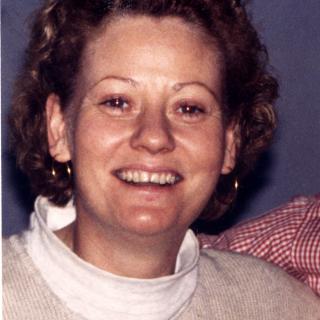Sheryl Thayer was born on 6 December 1956 in the town of Gore, on New Zealand’s South Island. She qualified as a registered general and obstetric nurse in 1979 in Dunedin and started work as a staff nurse in the city’s Public Hospital. Later that year she spent four months as the sole registered nurse on the Palm Island Aboriginal Reserve, near Townsville, Australia. In 1980 Sheryl moved to London, England, where she spent three years working for a nursing agency. She then returned to New Zealand and found a position as a staff nurse at Wellington Public Hospital. Sheryl worked in the hospital’s accident and emergency unit from 1984 to 1988. During her time there, she gained a postgraduate accident and emergency certificate; she later completed an advanced disaster management course in Australia (1988).
Sheryl was intelligent, dynamic, practically minded and had a great sense of humour. She was someone who was never afraid to voice her opinions whatever the subject. At the same time, she had a reserved, sensitive side, known to those family members and friends with whom she had forged the deepest of bonds. These unshakable ties gave her the confidence and freedom to strike out on the different and diverse path that she had chosen for herself.
Seconded from the New Zealand Red Cross (NZRC), Sheryl embarked on her first ICRC assignment in January 1989. Her destination was the Khao-I-Dang surgical hospital, close to the border between Thailand and Cambodia, where she spent six months as a surgical ward nurse and head nurse. She returned to New Zealand in July 1989, where she became the charge nurse at the Auckland Central Medical GP surgery and accident clinic. This was followed by a three-month stint at Wellington Public Hospital as a staff nurse on the recovery unit.
In June 1990 Sheryl was back on assignment with the ICRC, this time in Kabul, Afghanistan, working as a surgical ward nurse. She spent nine months there. She then returned to Khao-I-Dang in August 1991 for a one-year ICRC assignment as a surgical ward nurse and acting head nurse. In January 1993 she began a postgraduate course in operating theatre nursing while working as a staff nurse at Wellington Public Hospital. The ICRC came calling once again in July 1994, with Sheryl spending six months as a surgical ward nurse in Jalalabad, Afghanistan.
In early December 1996, Sheryl started a new assignment with the ICRC in the Russian republic of Chechnya, again seconded from the NZRC. She was based in the village of Novye Atagi, some 20 kilometres south-west of the capital Grozny, where the ICRC had opened a field hospital. Sheryl arrived full of enthusiasm, brimming with energy and committed to her work as a surgical ward nurse.
In the early hours of 17 December 1996, six delegates, including 40-year-old Sheryl, were shot dead by masked gunmen in their rooms in the ICRC residence next to the field hospital. Like Sheryl, four other murdered delegates had been seconded to the ICRC from National Red Cross Societies: Ingebjørg Foss, 42, and Gunnhild Myklebust, 50, both nurses with the Norwegian Red Cross; Hans Elkerbout, 47, a construction manager with the Netherlands Red Cross; and Nancy Malloy, 51, a medical administrator with the Canadian Red Cross. The sixth delegate was head nurse Fernanda Calado, 49, from Spain, who had worked for many years with the ICRC. Another delegate, Christophe Hensch, a Swiss national in charge of the ICRC's Novye Atagi office, was shot and survived.
Jean de Courten, the ICRC’s director of operations, called the attack a cowardly, “deliberate assassination”. Following the tragedy, the ICRC evacuated its remaining 14 delegates from Novye Atagi. Local medical staff continued to care for patients at the hospital. Speaking at a memorial ceremony at Saint-Pierre Cathedral, Geneva, just days after the attack, ICRC President Cornelio Sommaruga said: “All six were dedicated to the ideal of solidarity with the victims of the Chechen conflict. They were fulfilling with exemplary enthusiasm the original mission of the Red Cross – to care for wounded – and they were doing it in the same spirit as the women of Solferino: ‘Tutti fratelli’ [We are all brothers].”
Sheryl was a highly professional and experienced nurse who was driven by a strong sense of justice and an unwavering commitment to those in her care. She lived by her own high standards and followed her heart, always putting others first and giving her all. Anything less just wouldn’t have been right.
